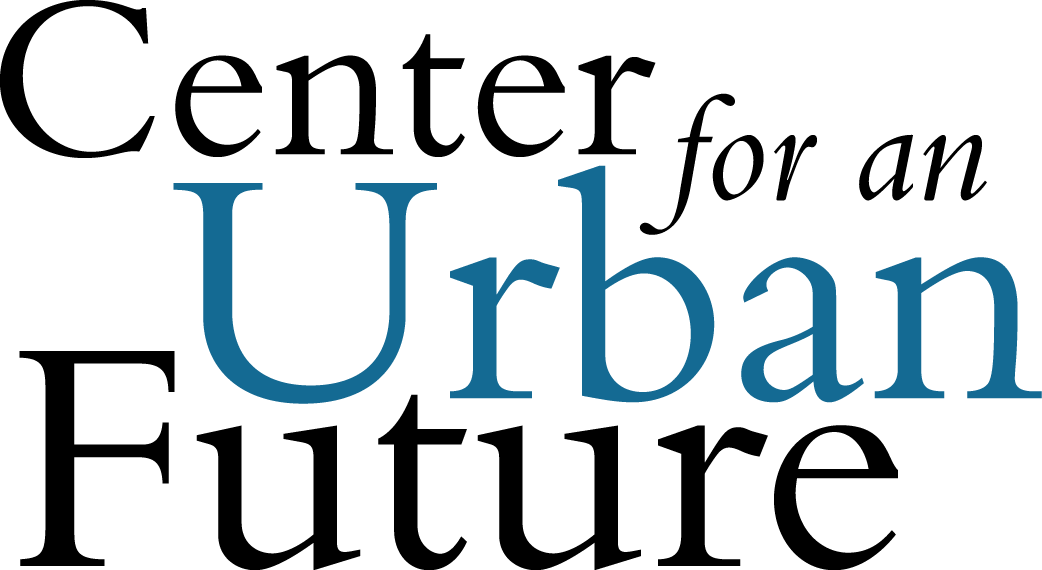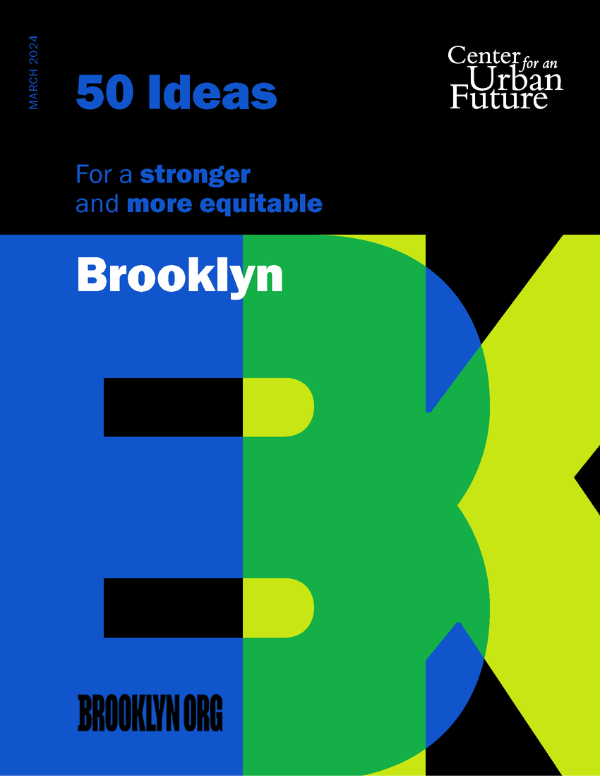
.png)
.png)

"Ideas for Creating a Stronger and More Equitable Brooklyn"
A Center for an Urban Future and Brooklyn Org Policy Symposium
Replay of the event
Event materials
Pictures
Photo Credits: Zubin Bhattacharya
On June 3, 2025, over 220 people attended or tuned in to “Ideas for Creating a Stronger and More Equitable Brooklyn,” a half-day symposium focused on generating innovative and actionable policy ideas for Brooklyn's future. Organized by the Center for an Urban Future and Brooklyn Org, and sponsored by Valley Bank and LinkNYC, the unique event included: ten three-minute idea pitches from leaders across the borough; a session where more than 30 Brooklyn-based leaders who were members of our audience each shared a single idea for creating a stronger and more equitable borough; a panel featuring Brooklyn Borough President Antonio Reynoso, Council Member Rita Joseph, and Council Member Crystal Hudson; and a panel featuring five of Brooklyn's leading policy experts and community leaders--Gregg Bishop, Jimmy Chen, Michelle de la Uz, Blondel Pinnock, and Jocelynne Rainey.
The event built on our March 2024 report, 50 Ideas for a Stronger and More Equitable Brooklyn, which featured bold policy ideas from a diverse mix of 50 exceptional Brooklynites for what city leaders can do to create a stronger and more equitable Brooklyn.
The full replay of the event is available here.
The event generated dozens of interesting ideas for creating a stronger and more equitable Brooklyn. The three-minute idea pitches from Brooklyn-based leaders included:
- Provide free legal representation to the growing number of Brooklyn homeowners facing foreclosure
- Lurie Daniel Favors, Executive Director, Center for Law and Social Justice at Medgar Evers College - Reimagine the brownstone to help address Brooklyn’s housing crisis
- Jonathan Marvel, Founding Principal, Marvel - Make the suite of supports now provided to students in CUNY ASAP also available for young people participating in nonprofit job training programs
- Reuben Ogbonna, Executive Director & Co-Founder, The Marcy Lab School - Launch a universal climate literacy campaign
- Frances Bronet, President, Pratt Institute - Harness Prospect Park to improve the health of Brooklynites
- Morgan Monaco, President, Prospect Park Alliance; Prospect Park Administrator - Open mental health care centers designed to serve Brooklyn’s recent arrivals
- Lorena Kourousias, Executive Director, Mixteca - Revamp the affordable housing lottery to help long-time Brooklyn residents stay in their neighborhoods and build a larger constituency supporting new affordable housing developments
- Vivian Liao, Principal, Ailanthus; Co- Founder, Totem - Create community-based digital equity hubs to provide access and training
- Asenhat Gómez, Interim Co-Executive Director, El Puente - Expand policy and education initiatives designed to reduce bias in AI
- Julia Stoyanovich, Director, Center for Responsible AI, NYU Tandon School of Engineering - Create a hub to improve outcomes for Brooklyn’s young adults through collective action
- Ramik Williams, Co-Executive Director, KAVI (Kings Against Violence Initiative)
The event also included an extended session where members of the audience shared their own ideas for the borough’s future. The following are abbreviated summaries of these audience ideas. To hear the full comments/ideas, please watch the event video. Audience ideas included:
- Create a commercial property tax abatement for owners who lease at reduced rates to underrepresented or low-income business owners, prioritizing district residents.
- Create and subsidize more co-working spaces in Brooklyn for people who want to start their own businesses.
- Develop affordable housing that focuses on commercial, environmental, and recreational spaces in addition to residential space.
- Provide more resources to South Brooklyn, focusing on microgrants and better transportation access.
- Promote the expansion of worker-owned cooperatives by providing workers interested in this model with education, workshops, and technical assistance.
- Expand pathways to construction jobs for Brooklyn students who’ve completed OSHA training.
- Place uninhabited homes in community land trusts and use tax incentives to build up housing that is co-owned by the community.
- Reduce the requirements for organizations and businesses applying to or receiving government grants, specifically the administrative burden of paperwork.
- Boost literacy for young people in Brooklyn by bringing books into third spaces frequented by families, beyond libraries and bookstores.
- Launch a grant program to support small businesses in the creative economy.
- Create a mechanism for nonprofits that lost their spaces during COVID to find a new home in vacant storefront or commercial spaces.
- Expand apprenticeship and mentorship programs for Brooklyn teens.
- Embrace a High Line but Everywhere concept for Brooklyn, creating new public spaces across the borough that are not only functional but also beautiful.
- Create an alternative funding pathway that leverages public and private partnerships for small businesses to pool resources together and build up capital.
- Push the MTA to capture the real estate value created through the forthcoming Interborough Express (IBX) project and reinvest it in local projects that boost transit and strengthen communities.
- Provide resources, including mentorship and start-up grants, to help high school students found their own startups.
- Create an interactive platform for students to explore organizations and industries that offer mentorship programs.
- Launch a revolving loan fund to provide low-cost construction financing for publicly owned, mixed-income housing developments, modeled on a successful initiative in Montgomery County, Maryland.
- Create programs for universities to offer law school scholarships for students to specialize in immigration law.
- Create a fund for the borough’s many high-skilled immigrants to get their degrees verified, clearing a path for them to access better paying jobs.
- Treat Brooklyn’s parks as essential infrastructure, like transit and schools, and invest in their maintenance, infrastructure, and programming.
- Prioritize the vital role of nonprofit arts organizations in the broader creative economy.
- Disrupt the prison-to-shelter pipeline by using technology to link returning citizens to neighborhood-based housing and support services.
- Bring more of the borough’s vibrant civic and cultural life outdoors by scaling up open streets initiatives.
- Create more spaces across Brooklyn that offer drop-in mental health services.
The event also featured :
- A dynamic panel with Brooklyn elected officials:
- Brooklyn Borough President Antonio Reynoso
- Council Member Crystal Hudson
- Council Member Rita Joseph
- And a panel discussion with community leaders:
- Gregg Bishop, Executive Director, Joe and Clara Tsai Foundation's Social Justice Fund
- Jimmy Chen, Founder & CEO, Propel
- Michelle de la Uz, Executive Director, Fifth Avenue Committee
- Blondel Pinnock, President & CEO, Bedford Stuyvesant Restoration Corporation
- Jocelynne Rainey, President & CEO, Brooklyn Org
A video of the full event is available here.
This symposium was convened by the Center for an Urban Future and Brooklyn Org with generous support from ValleyBank and LinkNYC. We are also grateful for general support from The Clark Foundation, The Altman Foundation, and ongoing support from a number of other philanthropic funders.
_291_388_bor1_a4a4a4.jpg)


.png)
.png)


